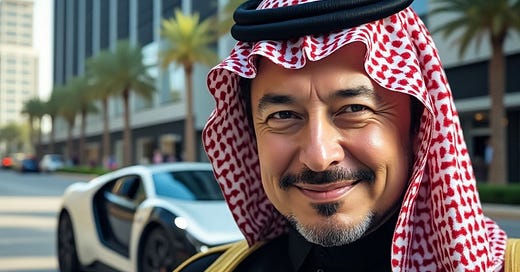Update: A week after posting this essay, Musk was forced to reveal shareholders in X, which you can see here. The disclosure was in response to a motion filed by the nonprofit Reporters Committee for Freedom of the Press, acting for technology reporter
.Is Elon Musk a raging free speech hypocrite? I am starting to think so. At the very least, he’s conflicted and inconsistent.
In recent days, the brilliant and controversial entrepreneur has tweeted a barrage of criticisms directed at the UK, mocking the country’s nanny-state censorship as it contends with domestic strife following the fatal stabbing of three young girls in Southport. Examples are here, here, here, here, and here.
I am passionate about free expression and sympathetic to concerns about the UK’s social media policing. But Musk’s impulsive, boomer-tier UK criticism is misguided and likely to backfire. His inconsistent and undiplomatic approach may set back his stated cause by summoning a backlash.
Exhibit A of Musk’s hypocrisy is the cap table of X. The second-largest shareholder next to Musk is billionaire and prince Alwaleed bin Talal from Saudi Arabia. This is the country that sentenced Mohammed al-Ghamdi to death, killed Jamal Khashoggi, participated in 9/11, and infiltrated Twitter to crack down on dissidents. Over 100 Saudi Arabian citizens have been executed so far this year, including political dissidents.
But has Musk criticized Saudi Arabia’s speech suppression? No. It seems odd for a self-proclaimed free speech champion to choose Saudi Arabia’s Kingdom Holding Company as his primary financial partner.
Musk’s silence extends to Russia too. Putin made it illegal to discredit the army after invading Ukraine, and more than 6,500 people have been arrested or fined for questioning the war or expressing sympathy with Ukraine. Just days ago, an 87-year-old pensioner was assaulted on a Moscow bus for his alleged criticism of the Wagner mercenary group. Where did Musk comment on that? Musk never commented on the detention of American journalist Evan Gershkovich either, but did speak out about the pro-Russia propagandist Gonzalo Lira.
Under Xi Jinping, China has ramped up its nanny-state censorship to dystopian levels of digital autocracy, but Musk has mum on speech suppression there too. C’mon Elon, where are the Winnie the Pooh memes? He’s tweeted “China is awesome” and “China is a powerhouse" and other positive remarks only.
Musk doesn’t criticize Israel either, despite its growing media censorship and alleged human rights violations. I tend to be pro-Israel and was devastated by what happened on October 7th, but that doesn’t mean the country is above criticism. Why is Musk mum about Israel but vocal about the UK?
To be clear, I am not advocating that Musk speak out on all of these issues. I understand there are practical considerations and business interests at stake. I am simply pointing out that it is weird how much he is criticizing our faithful ally, the UK, relative to other countries with graver issues and more suppression of speech.
Some argue, as my friend Joe Norman does, that the UK registers higher among Americans because it is culturally closer to us. We have higher standards for the UK as a liberal democracy and view it as tied to our politics. These are valid points for the average American political commentator, but Musk’s wonton anti-UK shitposting seems like an abuse of his platform power and misplaced targeting. Many in the UK view it as meddling in their politics.
The question remains: Are Musk’s actions serving the cause of free expression, or is he setting it back by partnering with authoritarian countries while nitpicking western democracies? I understand the argument that losing freedom of speech in the West means losing it everywhere, but his approach seems inconsistent and reckless.
I was excited when Musk bought X back in 2022. The year before the purchase, I wrote “The Terrain of Discourse” in American Affairs arguing that the power to shape discourse is a form of geopolitical power. Musk’s purchase seemed to validate my thesis. I had hoped his ownership would be good for global freedom while providing balance in our media environment.
Today, I am mixed-to-negative on Musk’s ownership of X. I like his bias toward free expression but don’t believe he’s been a good steward. He has the tweeting sensibilities of an 2015 alt-right basic bro when he would be better served by remain above the fray. He makes impulsive content moderation decisions when he should professionalize the company’s approach to navigating decisions that have political and geopolitical impact. Politically, he often is his own worst enemy.
Musk is an incredible entrepreneur, but I increasingly question his commitment to free expression relative to his business interests and personal whims. If Musk is sincere about free speech, why does he throttle links to competitors like Substack, a practice that is anti-speech and anti-competitive?
Musk’s behavior is full of conflicts and inconsistencies when it comes to free expression. He’s a hypocrite, plain and simple.







There is a simple answer here: those other countries don’t pretend to have free speech. They don’t pretend to be liberal. They’re nakedly authoritarian and Americans generally don’t doubt this.
Western elites have been justifying their authoritarianism on the grounds of “protecting democracy.” There’s a clear movement to try and prevent criticism of the powers that be. If free speech dies in the west, it’s dead forever.
When it comes to suppression of speech by governments, I'm not sure Musk is so much a hypocrite as much as someone whose brain has been melted by right-wing shitposts and ragebait. It seems as if he's lost sight of politics beyond his feed of infinite scroll to the point that his behavioral dissonance doesn't even register in his psyche. His suppression of links to Substack, on the other hand, appears much more blatant